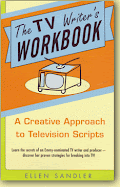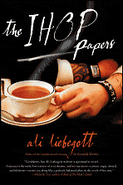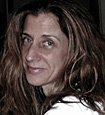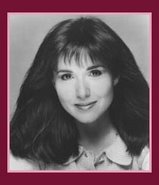


Welcome to “Up Close & Personal.” For every interview I will be introducing a literary personality discussing her views and insights, as well as upcoming literary events around the world.
Today’s interview is with Marley Gibson, writing as Kate Harmon. She's the author of "Sorority 101" a must-read book for everyone who dreams to be in the sorority. "Sorority 101" is about three girls with true friendship and their bond of sisterhood.
EI: Would you share some early insight into who you were as a teenager with your readers? What were you like as a teen? Please tell us more about Marley Gibson -- the woman behind the author.
M. GIBSON: Wow. . . as a teenager, I was a northern-born girl growing up in the deep south. I was your typical band geek, and then, eventually a varsity cheerleader. I was in the Honor Society and Who’s Who and all of that, but I was really into school spirit and participation, event planning and being in every club imaginable. In the summer between my freshman and sophomore year, I was diagnosed with bone cancer, which I was treated for and beat. It certainly changed my outlook on life. . .not that I didn’t appreciate things, but fighting a disease that could possible leave you with only one leg is a lot more eye-opening than who’s dating who and who’s not speaking to what person.
EI: Do you express your inner self in your writing or do the personas you create exist only in your imagination?
M. GIBSON: Good question. The answer is both. That’s not a cop-out, but how can you not express your inner self when you’re opening up emotions and pouring words onto a page? But I do love creating characters and deciding what they’re like, what their challenges are, what they look like, etc. I wrote eleven (11) manuscripts before my sorority series sold and a lot of those characters are very real and 3D to me. I tend to put expressions of myself into my stories, like what I like to eat, drink, music I listen to, etc. Write what you know, right?
EI: What is your response to the public perception that writers’ creative insight and energy is frequently the product of personal conflict?
M. GIBSON: I haven’t really experienced that perception yet, but I do know of other writer friends who have run into that. You know, life is full of personal conflict and conflict is what fuels fiction. So, if people want to bring their insight and energies into their writing, I have no problem with it. It’s all in the execution. As a fan of reading, I’m just looking for a compelling story that keeps me turning the pages.
EI: What would you like to say to writers who are reading this interview and wondering if they can keep creating, if they are good enough, if their voices and visions matter enough to share?
M. GIBSON: Well, I say. . . anyone who wants to write and feels they have characters in their head and a story to tell. . . quit talking about it and thinking about it and just sit down and do it! You never know what you’re capable of until you try it. Everyone has a voice and a vision. Some people just express it in writing. Others through song, or dance, or painting, or in working with old people, or taking care of little animals. I believe we’re all creative and have the ability within us. It’s honing so much about honing your craft and practicing and just doing it!
EI: Many writers describe themselves as "character" or "plot" writers. Which are you? And what do you find to be the hardest part of writing?
M. GIBSON: I am a plotter allllllllllll the way. I can’t start writing a story until I can see it in my head, from start to finish, like a movie – from opening to closing credits, complete with full orchestration and soundtrack. Seriously. At that point, I write an outline or synopsis and then just start writing. I type about 100 words per minute, so once I can fully visualize my story, I just get it out of my head as fast as I can and then go back and polish, straighten and tighten to make it better. The hardest part of writing? Well, I think for a lot of people, it’s just giving yourself permission to sit at the computer and do it. I know too many people who are hesitant to write—although they have stories—because they’re afraid of what other people will think. Who cares?! Write for yourself. Write for the pure enjoyment of it. Write because if you don’t, you’ll explode. For me, the hardest part of writing is believing that my ideas are sellable. But then, I plow forward on them anyway.
EI: Are you armed with notebook and pen at all the times? Do you always carry your laptop or PDA with you to write?
M. GIBSON: Oh, you know it! I have about three notebooks of various shapes that I keep with me at all times. When I’m working on a story, I keep my AlphaSmart Neo with me. I have a flash drive that I carry with me everywhere that has everything I’ve ever written on it. You never know when you can pull a scene from a five year old manuscript, spruce it up, and add it to the work in progress. I have to say that I’m constantly thinking of ideas, directions, new characters and am always testing out dialogue in my head. I know. . . I sound like a crazy person!
EI: Do you let anyone read your manuscript, before you send it to your editor or agent?
M. GIBSON: Sure. . . I think you have to. I have a very solid, trustworthy critique partner, whom I’ve known since 2002. We started out on this whole writer’s journey at the same time and experienced some of the same pitfalls and successes. She sold her series a year before I did, but I was just as happy for her than had I sold. And the same thing for her when I sold. We have similar voices and the same warped sense of humor, so we’re able to help each other out. I also have some trusted readers who’ll just read through and give me their overall impressions and not a line-by-line critique. When you work on a manuscript, your eye can become married to it and you can skip over typos, grammatical errors, and missed words. I think it’s essential to have fresh set of eyes on it – especially before submitting to an agent or editor.
EI: Was there anyone who really influenced you to become a writer?
M. GIBSON: I would say my parents encouraged me to be creative. Whether that was playing the piano or trumpet as a teenager or doing advertising campaigns in college or writing marketing and public relation pieces in my professional career, they always stressed that I use the talents given to me to the best of my ability. I always excelled in English and Writing classes, so I think it’s only natural that I fell into writing as a beloved hobby.
EI: Now let’s shift gears here for a second... . tell us what is the premise of your book ‘Sorority Rush Begins?’ which I understand will be published by Puffin Books in summer of 2008? Can you give us a sneak peek?
M. GIBSON: Just a correction on the title. . . “Sorority Rush Begins. . .” is my marketing line for the series. The first four books in The Sisterhood Series are Rush, Pledge Class, Greek Week, and Spring Formal – all with A Sisterhood Novel after the title. The books are set on a fictional college campus in central Florida, steeped in rich, Southern tradition, and are centered on three very different heroines, each going through Sorority Rush for different reasons. Rush and Pledge Class will be released simultaneously in May 2008 in a push for the series.
EI: Can you share with us some of the challenges you faced to publish this first novel ‘Sorority Rush Begins ?” Is there anything about you that you would do differently, knowing what you do now?
M. GIBSON: My challenges in getting published were before this series idea. I had come close with a couple of chick lit manuscripts and then a romance I had written, but lines went under and it just wasn’t in the cards. Also, I was with my first literary agent and two and a half years into trying to sell. I felt I needed to shake things up a bit, so I signed on with a new agent who thought I should take a stab at the Young Adult market. Again, we came close with a manuscript, but it didn’t sell. In January 2006, a publisher came to my agent (because of her reputation in selling YA) and asked if she had a writer who could write a proposal for them based on three heroines all going through Sorority Rush. My agent knew me and my voice well enough to know that 1) I was in a sorority in college and 2) I could do this quickly and get it back to the editor. I came up with a three-book idea with three heroines and submitted it in early February. By March 16th, we had the deal. What I know now that I’d do differently? I wouldn’t have wasted so much time with an agent relationship that wasn’t working for me. But then again, everything happens for a reason, right?
EI: What was the inspiration for your novel? What is your response to the public perception about your creative insight with your book?
M. GIBSON: As I said, the original concept for the series was my publisher’s. Both of my editors were/are sorority girls and they really wanted something that focused on the sisterhood and philanthropy that the national sororities provide. I, of course, drew upon my own college experiences, but then again, that was a thousand years ago (LOL!), so I talked to some friends who were just out of college and studies their sorority experiences. I hope that I’ve weaved the two together nicely in the books.
EI: How much of your characters is planned out in your head? How do you know where you will go next with them? What was your biggest challenge in creating them?
M. GIBSON: These are common questions, yet not easily answered as it will vary from writer to write and even from story to story. I like to see my characters as 3D figments in my imagination before I start writing. However, as I begin writing, sometimes a character will decide “hey, I want to do fill-in-the-blank” and I realize that might be best for the story. Other times, I know exactly the journey I will take them on. As for how I know where they’ll go next? Let’s just say I have an overactive imagination and love playing “what if.” I’ve always been the type of person that people watches and tries to come up with a back story. Like, the other day, my husband and I were sitting in traffic and this woman walked by us with the gargantuan bucket. The rest of the way home, I had come up with not only what she had in the bucket, but why she had it, where she’d gotten it, where she was going with it and how much she paid for it. Nonsense? Perhaps, but a lot of fun. I honestly have to say I have never had a problem creating characters.
EI: How did you develop these characters? Did you work them out in advance, or did they evolve as you wrote the story?
M. GIBSON: In developing the characters, I knew the publisher wanted three heroines and I thought it would be more realistic to have them from very separate backgrounds. The first girl, Roni, is a Boston Brahman who escapes her Beacon Hill, Harvard-bound life to go to a state school fifteen hundred miles from her hands-off, aristocratic parents. The second girl, Jenna, is a bubbly, fun, cute girl from Atlanta, who grew up in a house full of kids, but she is battling a disease that makes fitting in sometimes difficult. Then, there’s Lora-Leigh, a native of Latimer (my fictitious town), who wants nothing more than to get away to NYC or LA for fashion design school, but because her father is Dean of Students at Latimer, she can’t escape the city limits just yet. I planned these girls out in advance, but, of course, as I’ve been writing, they are evolving. . . just like people evolve as they get older. It’s a lot of fun to see what each girl is going to pull on me! LOL!
EI: What is a typical work day schedule when you are in full writing mode? Would you tell us a little about your process for editing, revising, and novel development? How long did it take you to write ‘Sorority Rush Begins’ including the time it took to research the book?
M. GIBSON: First of all, I have a full-time, 8 a.m. to 5 p.m. job. When I’m working on a story, I will bring my AlphaSmart with me and work over my lunch hour and then I’ll go to work in my writing room at home after work. Because of my speed in typing, I can get about 1,500 words done in an hour. So, when I’m in the blood fever of writing, if I can get 1,000 words per day done, then I’m golden. To me, it’s all about staying on schedule and getting things to your publisher (or agent) in a timely manner and when they ask for it. As for writing Rush, I did an initial draft, then a re-write and a round of copyedits. I started working on Rush last year and it took about eight months from first draft to final copyedits. I don’t know if this is typical or not because this is the first book in the series and we really worked hard to make sure it had the right feel and tone to it. Also, it was my first time working with an editor. I researched pretty quickly, but it was mainly reading back copies of my sorority alumnae magazine and talking to my friends fresh out of college. The research on this one really is an example of write what you know. People who went to The University of Alabama (like I did) will definitely recognize the layout of the campus of Latimer University.
EI: What about writing for young adult & teens appealed to you?
M. GIBSON: I think there are a lot of opportunities in writing for teens that you don’t necessarily have when you’re writing for adults. Teens are growing and developing and always learning, so it’s easier to have a naïve character that needs to go on a personal journey towards a particular goal. Not that you don’t do that in adult writing, but I find the innocence of my YA characters to be a lot more fun and challenging in terms of crafting and forming them. I still read and write adult stuff and would love—one day—to publish some of my adult fiction. We’ll see!
EI: Do you feel more pressure, feel insecurities or are you able to separate all that from your own creative process?
M. GIBSON: I’ve never really felt pressure in my writing. From day one of writing, I put myself on a very strict schedule, always giving myself a “deadline,” so that when that magical day came that I got an editor, I would be able to produce on time for them. The only pressure I have is on me to get it done. I believe every writing goes through insecure phases, especially when you’ve been through a few years of knocks, pings, and rejection from the publishing industry. But you have to remind yourself that it’s a business and it’s not against you personally. You have to get back on that horse and go to the next project. Insecurities will creep into you head if you allow the elves of self doubt to tell you stupid crap and you listen to them. That’s why you have your close circle of trusted friends you can go to when those insecurities hit. You share them with those people, let them build you back up, and hand you tissues to dry your tears. You don’t blog about it or shout it out to the universe. . . you just deal with and then get back to work. It’s like that in any career you have, especially where you’re putting yourself out there in such a creative manner.
EI: What's next for your fans?
M. GIBSON: Oooo. . . I have fans? Exccccccccccellllllllllent!!! In 2008, there are four books in The Sisterhood Series. I hope people who read the first couple will not only love them, but will buy the following ones and then request more books in the series from my publisher. I would love to be able to write these characters all the way through their college graduation. How fun would that be?!?! People are welcome to visit me online at my website at http://www.marleygibson.com, where they can e-mail me, or visit my group blog that I do with six other amazingly talented YA authors, http://www.booksboysbuzz.com.
EI: Ms. Gibson, thank you for contributing to my blog. It has been a pleasure for me to get to know you, and your work a little better. Would you like to end your interview with a writing tip or advice for young aspiring writers?
M. GIBSON: My tip is if you really want to write and create and express yourself, then don’t talk about it, do it! Thanks for letting me do this!
http://www.marleygibson.com/
http://www.marleygibson.com/home.htm











.png)

















No comments:
Post a Comment